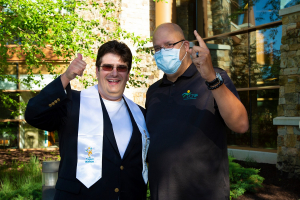
Stories of those who have been helped and inspired by your United Way donation
Promoting Independence impact stories
Kira was diagnosed with Lissencephaly at 33 weeks gestation, a rare, gene-linked brain malformation characterized by the absence of normal convolutions (folds) in the cerebral cortex.
Kira has seizure disorder, is non-verbal, and a wheelchair user. About a year ago, Kira started using a feeding tube to ensure she was getting proper nutrition in her body. The family had difficulty getting the special formula that Kira uses, and they started
getting low on their supply.
When they realized that they would run out before getting a new
supply, they reached out to UCP’s Inclusion and Advocacy
Program for assistance. The staff understood the
seriousness of the problem, without formula, Kira
would be unable to eat.
UCP was able to located several cases of formula
and expedited shipping to the family. There was enough
formula for Kira while waiting for another shipment, and
there was a small amount left in case of emergencies.
Jamie is The Arc Eastern Connecticut Self-Advocacy Coordinator. He's insightful, opinionated, and likes to be left alone to do things his own way. During the pandemic, Jamie learned many lessons about the the importance of asking for help in order to become more independent.
The Community Life & Advocacy program staff helped Jamie learn how to use all of the
online supports required to conduct business during COVID. Gradually he helped
everyone in the group transition to online meetings and encouraged
his peers to stay connected.
With help from the CL&A staff, Jamie set up trainings on
Board development, arranged an Arc presentation on Access,
Equity, and Inclusion, developed voter registration training,
and held a workshop on interacting with law enforcement.
Jamie is an enthusiastic participant in the Community
Life & Advocacy program, which has helped him realize the
power of group support and working together on goals that
support and advocate for people with intellectual and
developmental disabilities.
Steven came to Catholic Charities looking for help, he had been laid off from his job for months. He thought he would be called back to work, but when that did not happen he fell behind on his bills. Steven told his caseworker at Catholic Charities that he has a hard time asking for help and is usually the one helping others.
The caseworker sat with Steven and listened to his story. She gave him
hope when told that Catholic Charities can help with rental assistance
to prevent eviction. Steven was spending a significant portion of his
budget on purchasing food. His situation caused him to became
depressed and fearful for the future.
Steven was so relieved and grateful that the threat of eviction
would no longer loom over him. Additionally, Catholic Charities
helped him with food and applying for SNAP
(Supplemental Nutritional Assistance Program).
Eddie is a senior citizen who does not speak English, has a mental condition, and relies on his two best friends, his kittens, to help fight depression. Eddie rents an apartment with the help of a public housing program.
The property manager claimed that Eddie's kittens were disruptive to other neighbors and served Eddie with eviction papers. An eviction for Eddie would not only mean
losing his rental assistance, it would ultimately result in homelessness
and the possible loss of his beloved kittens.
Eddie came to his local Connecticut Legal Service (CLS) office
for help. The agency helped Eddie request a reasonable medical
accommodation, supported by a note from his doctor stating that
the kittens were necessary for Eddie's personal well-being and
management of his condition. Even though Eddie wasn't
evicted, he wanted to move. The agency helped him receive a
security deposit to find another place to live.
Eddie now resides in a pet-friendly apartment that he loves with
his two kittens, and he is no longer at risk of homelessness.
Q was referred to the Fatherhood Initiative for individualized case management and worked with a case manager to guide him towards meeting and exploring goals he had as a father.
The program gave him the skills to be more organized and helped him feel like he
wasn't alone. He enrolled in their 24/7 Dad classes as an extension of his
individual case management work and joined a support group of
other fathers.
Q gained a deeper understanding of what it requires to parent
effectively. He shared his experiences in a safe environment
with different fathers which helped him gain perspectives.
The 24/7 Dad classes also helped Q to develop skills creating
and keeping schedules. The program's ability to meet Q
where he was at in life and help him build from there was
key for staff to be able to consistently keep in contact with him
and to deal with the many stressors in life.
Donald is a resident at Martin House. He began experiencing auditory hallucinations at the age of fifteen. His family had trouble understanding him and what he was going through and could no longer support him. Donald left home at seventeen and spent several years incarcerated for various offenses. He then spent time in residential facilities that ultimately weren’t the right fit.
Fortunately, he was able to land at Martin House for housing and
comprehensive support services. He admits to being nervous before
arriving, but that it felt like "home" once he did. "It's different than
any other place," Donald says.
At Martin House, Donald has gained life skills, formed
friendships, and a sense of positivity. The staff at Martin
House allows each resident to go at their own pace and
helps them each get to the next step in their lives.
Donald says he is happy at Martin House and has a better
perspective on life. He appreciates the fact that he is a part of
a community and has met other people with similar interests
and who need similar supports.
Diane came into Phoenix House Transitional Housing program with very few tangible belongings. She and her children had spent the last several months running from a violent man who was controlling her. Diane wanted to create a safe home for herself and her children. They fled together and stayed at Safe Futures' emergency shelter until a space became available at Phoenix House.
Within a week of settling into Phoenix House, Diane enrolled her children in
their new school and found a job. Diane scheduled counseling,
so the family would have a space to process and heal. She enrolled
her youngest child in Camp HOPE and Pathways, Safe Futures'
camping and group mentoring programs for children
impacted by family violence.
Diane received help enrolling in classes to complete her
bachelor's degree. She continued to meet with her case
manager for housing advocacy, and she and her children
moved out of Phoenix House within two years and into
permanent, stable housing.
She is in her final semester for her bachelor’s degree.
Regina has two young children and was expecting a third. The family was homeless but fortunately entered Covenant Shelter of New London, another United Way Partner Program. Regina's first two children have special needs. Her oldest is on the Autism spectrum and the second has a perceived diagnosis of the same.
When an apartment opened at Thames River’s transitional housing program,
Regina left Covenant Shelter but felt very overwhelmed. She had no
healthy or natural supports.
Regina went through her daily routine with determination, and
with the assistance of her Case Manager and outside
resources, secured the services her family needed.
Regina learned effective coping and parenting techniques to
address the specific needs of her children. Within a year,
the family transitioned to a permanent home. Regina is
perusing a bachelor's degree in Accounting through
online courses.
Anthony fell upon hard times and was facing an imminent risk of homelessness and reached out to United Way 2-1-1, our region’s central intake system for housing and shelter diversion. Referred to New London Homeless Hospitality Center (NLHHC), Anthony connected with a specialist who assessed his situation and helped him avoid checking into an emergency shelter.
Anthony owned a boat that was suitable for living, however, he didn’t have the funds for a boat slip. NLHHC applied to United Way’s New London County Fund to End Homelessness (NLCFEH) for support to pay for the boat slip rent.
The NLCFEH focuses on rapidly rehousing individuals and families who are experiencing homelessness as well as keeping those who are at risk of homelessness in their current housing without ever having to enter shelter.
As a testament to the flexible funding that NLCFEH provides, they approved payments to a local marina for Anthony to house himself and his boat. This stability gave Anthony the chance to focus on working to become independent and maintain his home on the boat.
Each element of assistance provided by New London Homeless Hospitality Center was made possible due to funds that United Way was able to leverage. Their Diversion Specialist is funded through a grant that United Way administers. The slip lease for Anthony’s boat was funded by NLCFEH, a state grant that United Way has managed for the last ten years. Additional rental assistance under UniteCT was initially made possible through a state grant that United Way advocated for and made possible.
Nick is 17 years old, loves his little sisters, his dog, and riding his bike. Nick has CRASH Syndrome, which includes intellectual disability, seizures, and hydrocephalus. He also has difficulty speaking and walking. Nick's younger sisters spend all summer outside on their bikes. Nick used to join them but three summers ago, he outgrew his adaptive bike and could no longer participate in the family fun.
 Adaptive bikes can cost from $900 to $2,000. They need adaptations that ensure safety, such as seat belts, rounded handlebars that tilt and lift, foot pedals that are adjustable and a handle bar in the back for caregivers to push, brake, and drive.
Adaptive bikes can cost from $900 to $2,000. They need adaptations that ensure safety, such as seat belts, rounded handlebars that tilt and lift, foot pedals that are adjustable and a handle bar in the back for caregivers to push, brake, and drive.
With grant funding, UCP of Eastern CT purchased a new bike specially made for Nick in his favorite color, red. UCP added torso guards, a head rest, parental breaks, foot pedals with straps and of course, a helmet.
For Nick, his adaptive bike helped him cruise the neighborhood, keep up with his sisters and friends and offered many health benefits, including improving leg strength, balance, endurance, and fitness. When you think of independence, picture Nick with his red bike, cruising down the street with his sisters and friends.
David, the father of a six-year-old boy, has a severe anxiety disorder but was working full-time when his employer ordered him to work in close proximity to a customer who had tested positive for COVID-19. The situation triggered an anxiety attack and David had to leave work. David’s employer fired him the next day.
David applied for unemployment benefits but was denied so he came to Connecticut Legal Service (CLS) for help. David’s CLS attorney appealed the denial and represented him at the unemployment hearing.
In addition to providing all of the necessary information to show that David was eligible for unemployment benefits, David’s CLS attorney also called David’s therapist who testified that David’s anxiety disorder was the reason David left work. There was no intentional misconduct on David’s part.
The appeals officer agreed and found David eligible for the state unemployment benefits and supplemental COVID-19 unemployment benefits. David is now able to support to himself and his son.
Melody is a 19-year-old mother. After moving from one friend’s place to another, she eventually moved in with her sister. It was not long before she decided that this was not a healthy environment in which to raise her child. Using 2-1-1 Connecticut to help with her housing crisis, Melody and her son received financial support to stay in a hotel for a few days and then moved to an emergency shelter when a bed became available.
When Melody entered Thames River Family Program (TRFP), she told the agency she was ready to make changes in her life for her sake, but more importantly, for her son. She was anxious to become independent and learn to live on her own and she felt TRFP would help her to take things such as managing her money and paying bills. She also wanted to finish high school and eventually go to college.
While at Thames River, Melody received individualized support services with 24-hour staff presence. Melody received help with transportation to and from work and school, access to childcare for her son, and support around time management and balancing her responsibilities. Today, Melody is very pleased with what she has accomplished, but she was proudest when she walked across the stage to receive her high school diploma with her family in attendance.
Melody recently secured her first apartment and she and her son have started their new life.
Kevin is a young single father who suffered an injury at work and needed to enter a rehabilitation center for his injuries. Upon returning home, the abuse from his spouse escalated and he fled with his son. He called the Safe Futures 24-hour hotline.
Being homeless and fearful, the Safe Futures advocate arranged transportation for Kevin and his son to enter Safe Futures emergency domestic violence shelter.
While at the shelter, there was an opening at Safe Futures Phoenix House Transitional Living Program for Kevin and his son. They were finally able to experience safe and stable housing for the first time in their relationship while living among supportive neighbors. Within the first week there, Kevin let his ambition shine, working with a Safe Futures advocate in their Career Center to develop a resume, submit several job applications and interview for a position. He was offered the position, accepted it, and began working full-time the following week.
Safe Futures was also able to help boost Kevin’s interview confidence by providing him with professional clothing. He received the support from Safe Futures that he needed to pursue his career goals and support his family.
